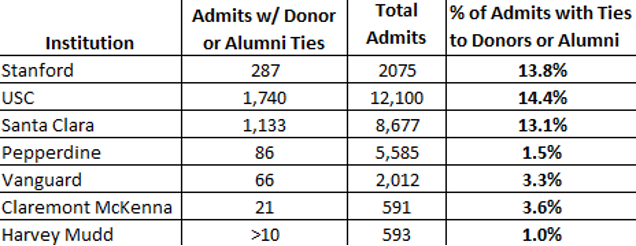During this summer, a team of students from MIT embarked on a journey to the sou …
California Legislature urged to once more consider banning legacy admissions in all higher education institutions
Carlos Changemaker

An assemblymember in California is pushing for the state to follow in the footsteps of others by urging private universities to end legacy admissions.
The proposed legislation aims to prevent private colleges and universities in the state from benefiting from state funding through the Cal Grant program if they show favoritism towards applicants with ties to donors or alumni.
This bill puts California among the few states that are contemplating restrictions on legacy admissions in both public and private educational institutions. On a national level, Sens. Todd Young, R-Ind., and Tim Kaine, D-Va., have put forth a bill that would prohibit public and private colleges from giving preferential treatment based on legacy connections in admission decisions.
Assemblymember Phil Ting, D-San Francisco, the drafter of the bill (Assembly Bill 1780), expressed his concerns, stating, “For the 1% of Americans, they have complete access, they have a back door, they have a side door, they have an express lane into our most elite institutions.”
Ting referred to a research study by Harvard University economists which revealed that children from families with an income exceeding $611,000 annually are over two times more likely to secure admission to a university compared to low- and middle-income families with similar exam scores.
While the majority of private institutions in California claim they do not consider donor or alumni connections in their admission process, and none of the public institutions base admissions on legacy status, six universities include this practice, as reported to the Legislature.
Particularly, Stanford, the University of Southern California, and Santa Clara University granted admission to over 13% of their students based on their affiliations with alumni and donors in the fall of 2022.
Kristen Soares, president of the Association of Independent California Colleges and Universities, remarked, “This is a fairly limited practice within our sector,” indicating their readiness to engage in discussions once the bill details are available.
Neither Stanford nor USC officials responded to requests for comments at the time of this article’s publication.

Sophie Callott, a senior at Stanford University and a legacy student due to her parents meeting there as law students, voiced support for ending the legacy admittance system.
“I do not want my achievements to be overshadowed or questioned by the possibility that I only got into Stanford because my parents went there,” Callott emphasized during the news conference organized by Ting to discuss the bill.
What is not known about legacy admissions?
The push to abolish legacy admissions gained momentum post a Supreme Court ruling that halted race-conscious admission programs in higher education institutions. California’s law has prohibited affirmative action in public colleges since 1996, with a failed attempt to reverse it in 2020. While California’s private colleges were not bound by the state’s affirmative action ban, federal funding compliance required adherence to the Supreme Court’s decision.
Alyssa Murray, a Stanford student and co-president of the Stanford Black Student Union, argued that legacy admissions contribute to racial preference and economic inequality. Eliminating this practice is considered a positive step towards cultivating true equity in higher education.
According to Murray, “For nearly a century, California private schools have predominantly admitted white students, creating an insurmountable racial imbalance.” She emphasized that legacy admissions favor white and affluent applicants at the expense of low-income students of color lacking alumni connections.
Efforts to counter legacy admissions were initiated by Ting in 2019 after the scandalous revelation of Operation Varsity Blues, where privileged students gained unlawful entry into top-tier universities. Despite the opposition from private colleges due to legacy admissions being unrelated to the scandal, Ting’s bill was unsuccessful. Concerns arose that restricting schools employing legacy admissions from the Cal Grant program would adversely affect low-income student populations in these institutions.
Reflecting on the past, Ting acknowledged that the Varsity Blues scandal lacked substantial data, leading to the bill’s failure in 2019. However, with more revealing statistics on the prevalence of legacy admissions, prompted by another bill he authored in 2019 forcing private universities to disclose admissions and enrollment reports, the narrative has now changed.
A June publication from the Association of Independent California Colleges and Universities, excluding data from Stanford or USC, disclosed that only five out of 70 private institutions practiced legacy admissions: Santa Clara, Pepperdine, Vanguard, Claremont McKenna, and Harvey Mudd.
“Legacy admissions perpetuates a cycle of privilege that fortifies inequity in higher education,” asserted Murray. “Legacy admissions perpetuates the racism of decades past when colleges and universities were closed to Latinx, Black, Asian American, Native Hawaiian, Pacific Islander, American Indian, and Alaska Native individuals.”


